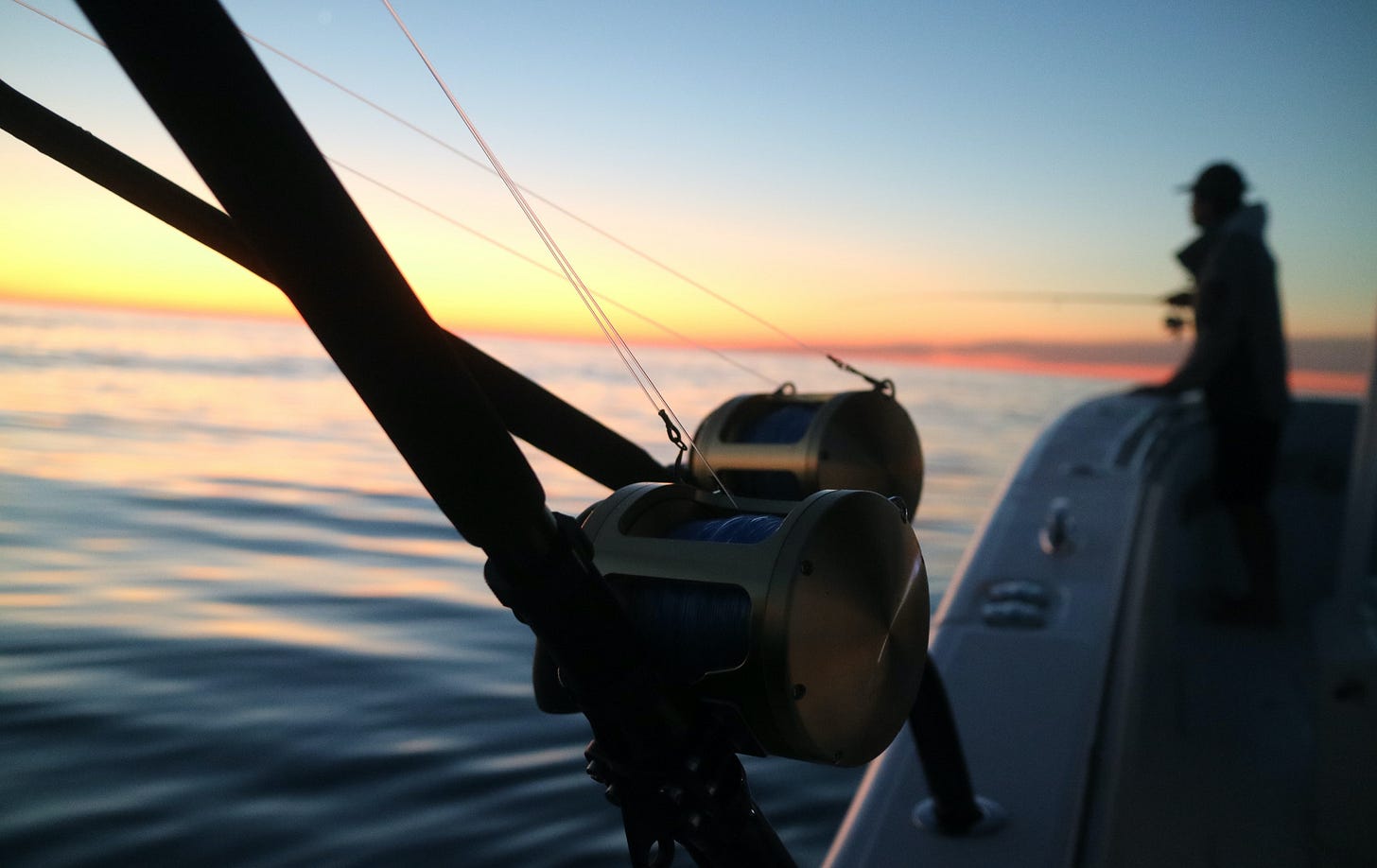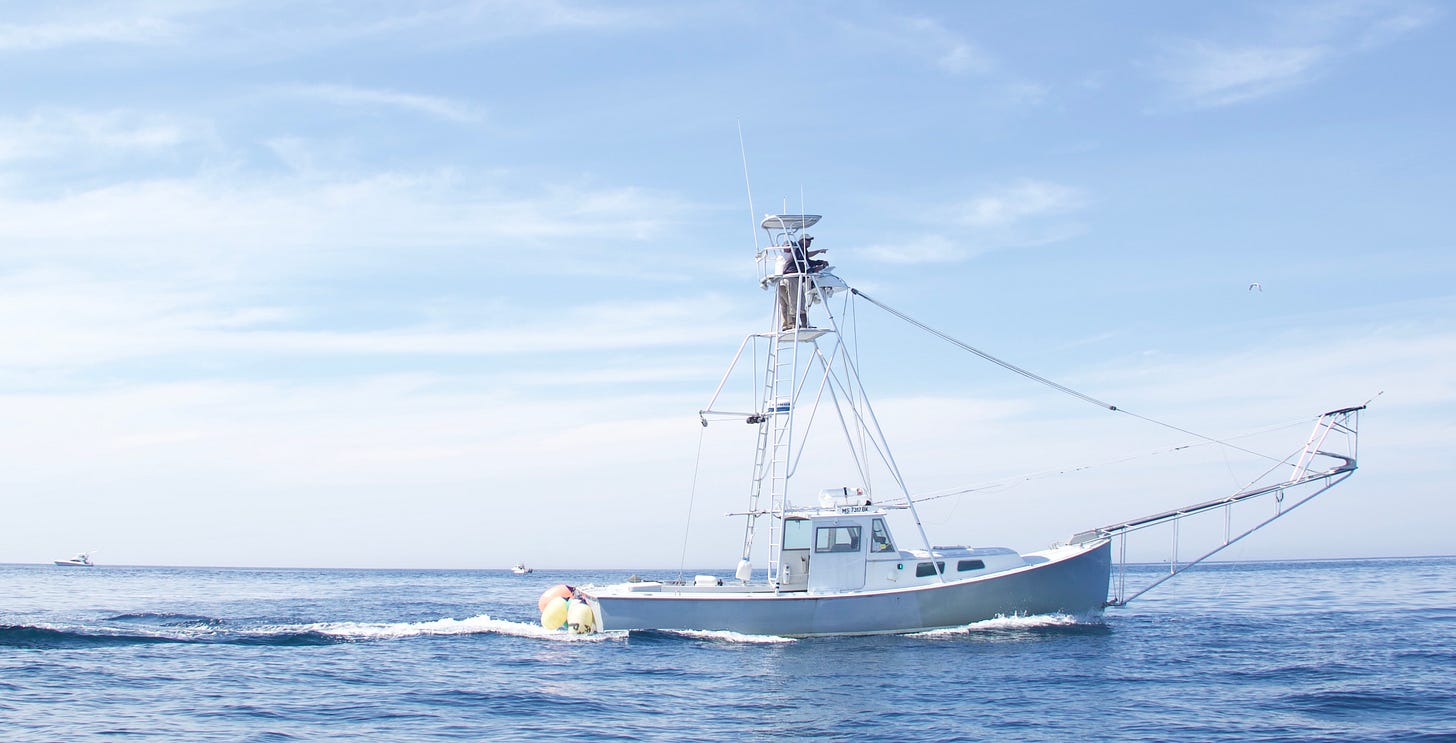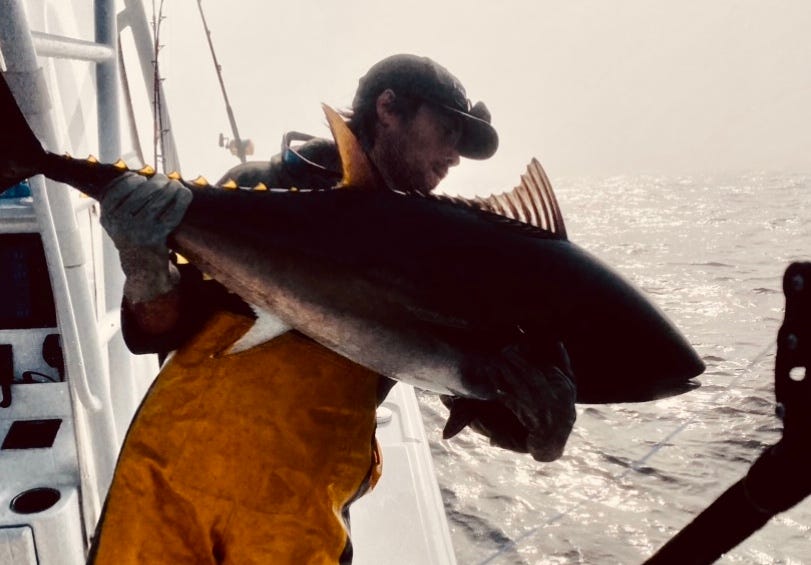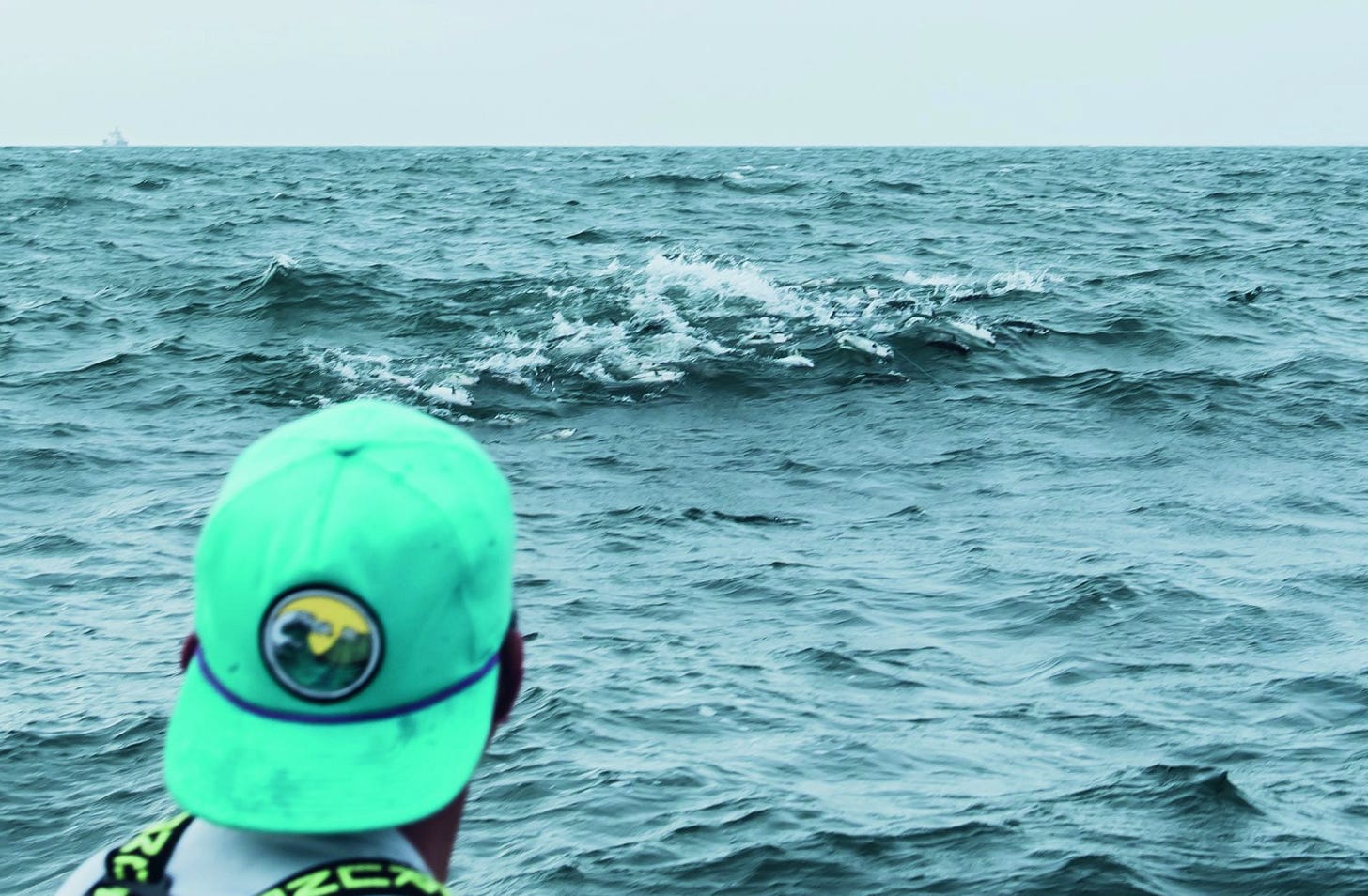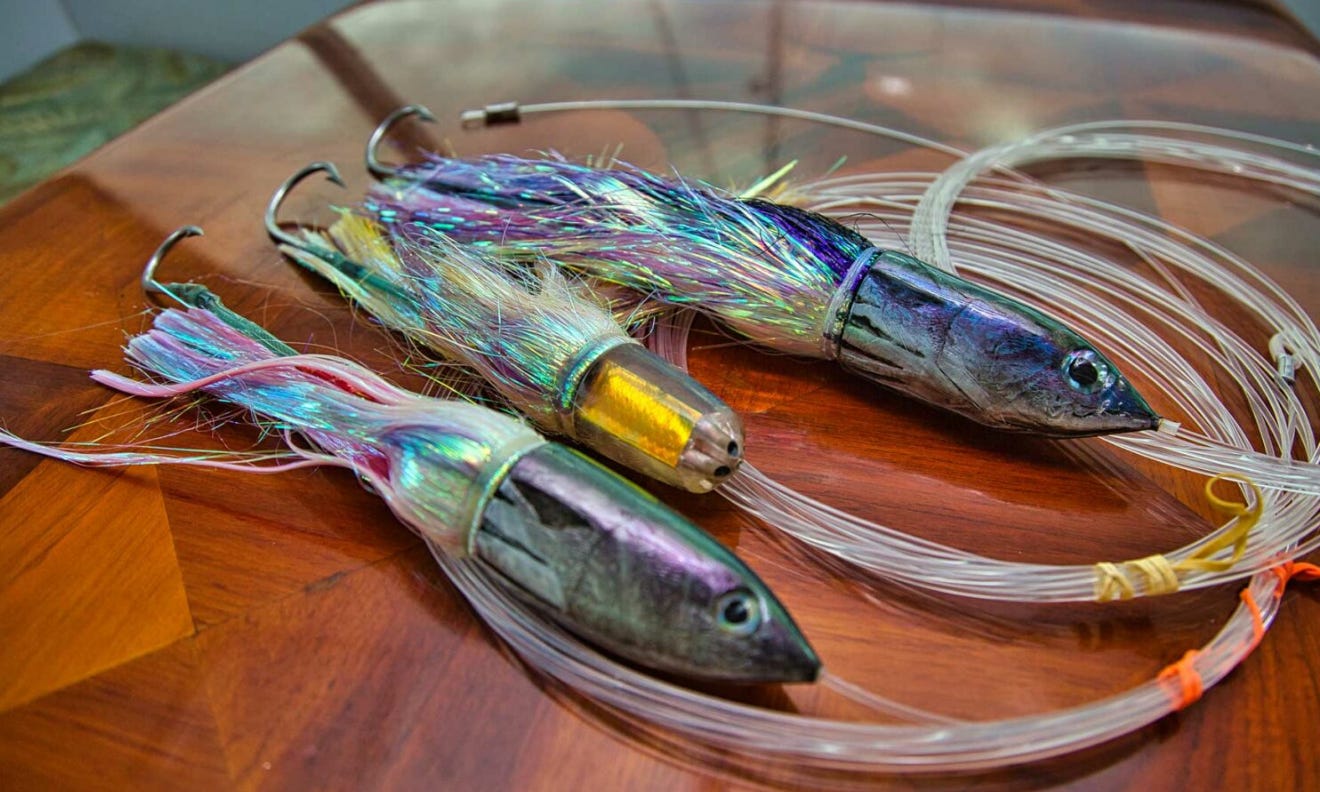Local Knowledge: The only thing rarer than finding an available slip on the Outer Cape is finding a place in life where you feel like you’ve always meant to be. The Weekly Salvage has been this figurative niche for me, combining passions for writing, angling, and helping others connect with a community I deeply respect. The first 99 chapters have been a blur of curious excitement and camaraderie, with the odd dash of writers block and self-embarrassment. I do not care to venture a guess on how many more are to come, but I know for sure that I am humbled by the support thus far. I’m indebted to many of you for your guidance over the last couple years, and hope I can continue to pay it forward in these pages and in-person.
I also want to thank my family for being unconditionally encouraging of this creative outlet and all the late-night, early-morning, solunar calendar-synchronized send-offs they’ve given me since I first became enamored with the rod & reel. To my father and first-mate through life, my only hope is that we can keep riding this wave until we can’t. We make a great team, even if our communication skills, weather-forecasting, and risk-analysis (hahaha) doesn’t always land on the same page. Like you always said on road-trips to lacrosse tournaments in Maryland, “its a long way to go to suck”, and so I couldn’t be prouder of all the epic adventures we’ve managed to share in the last few years.
I also want to thank my incredible fiancé, the most brilliant, driven and empathetic human I’ve ever met. You’ve gone beyond the call of duty; from the fishing shack gas debacle of 2020, to weathering episodes of acute Tuna FOMO, and being acceptive (within reason) of my conversational outbursts with regard to wind-farm construction, chlorophyll charts, and undying hatred for Butterfish. I promise on our wedding weekend next July, there will be no fear of missing out, because without you by my side, the tuna waffles (and every other facet of my life) would be a lot less sweet. If we do take a boat-ride to the ceremony though, maybe we can bring a rod or two…just in case?
Without further preamble, let’s dive into this special 100th edition of the Salvage, which represents something of an All-Star Break as the overnight temps dip and the midpoint of the Tuna season approaches. It’s pointless to give out awards per se, as we all know Teddy Bruschi has been the fan-favorite and MVP of 2023, but the Gulf Stream is also in close contention after assisting in so many incredible warm-water species landings across the Northeast. In sum, this week’s goal was to gather a literary and photographic tapestry of angling lessons shared by some familiar (and new) faces that have helped me advance as an angler and Captain these last few years, and frankly, I think we crushed it. Here we go!
Prompt - What is the best lesson or piece of advice you’ve received as an angler?
“This is cliche but it’s held true in many aspects: Never ever give up. There will be unbelievable days on the water and probably a lot of days that flat out suck. But if you’re passionate about it, never give up. Never give up the dream.” - Chris Blake, Unreel Sportfishing
“Fish where there are fish not where you wish there are fish.” - Cohen Babcock, Southcoast Sportfishing
“If you don’t learn from your mistakes, you’ll never improve. If I go out fishing and I don’t walk away with at least one critical learning moment, I have failed as an angler. My good buddy Zento instilled this in my brain. After that silent drive home in the car after not catching a Bass, Tuna or Albie, we will go in depth and go over things that we could have done differently. Presentation, approach to feed, time of day…everything matters” - Jack Burke, Fish Addict & Content Connoisseur
“Make your own luck, prepare for success, and always wear a lucky Siren Hat…hahaha but seriously, I’m a huge advocate that preparation is key to success. This could not be more poignant advice in our bluefin fishery. The notion that big fish are caught (the night before) at the rigging bench continues to be proven time over. This is a really demanding fishery particularly when it comes to tackle preparation as these fish will expose any flaws in your tackle and in your own physical conditioning for that matter! It really is such an advantage to become a student of the game and discipline yourself with your skills and preparation.” - Jason Ward, Siren Lures
“The best angling lesson I learned was to ‘fish for everything’. I started as a big time striper snob in College and into my first few years on Cape Cod. It's all I fished for. If it wasn’t a striper, caught from shore, I didn’t care. Then I looked some of the best striper guys out there, and realized that they fished for a ton of different species. The first time I fished with “Crazy” Alberto Knie, it was a frigid December night for walleye, and he talked about the parallels between that and weakfishing, and how angling for one helped him catch more of the other. That advice changed my perspective, and as I expanded my fishing horizons, even though I was spending more time fishing for other species, I began catching more big stripers. To this point, the greatest striped bass epiphany I’ve had came while steelheading. So, while it’s easy to get caught up in only wanting to fish for tuna, or stripers, or largemouth bass, there’s a lot to be learned from other, less glamorous fisheries that you can apply to your favorite species.” - Jimmy Fee, On The Water Magazine
“The best piece of advice I’ve ever got is that big fish are caught at the dock. Preparation is 90% of everything. The second is to always have a line in the water. These two very simple things are probably the most important rules in tuna fishing. I get secretly upset when I look over and someone is sitting down not fishing, relaxing. We came out to fish not relax!!” - Billy Hayes, Tuna Junkie
“The single best piece of advice I’ve picked up as an angler would have to be ‘don’t leave fish to find fish.’ It’s a true classic, but odds are if you leave a school of fish in search of bigger and better things, you’re going to miss something you were looking for in the first place. I think this goes hand in hand with my father’s favorite saying, ‘you can’t catch em without a hook in the water.’ If you’ve done the work and found the fish already, get lines in the water and fish!” - Matt Cody, Finatic Fishing Charters
“Hurry up and wait - If an area has what I’m looking for, I’ll see it through until it doesn’t look favorable anymore. There’s no use in getting jumpy and chasing an Inreach text or local report when what you could be looking for is slowly starting to happen and form right under you.” - Niko Okumu, Pelagic PHD & Energy Drink Taste-tester
“Best advice I can think of is you spend all this time looking for and finding bait. Take care of your bait. Another lesson is always get there earlier than you think. It could be the beach, dock, pond, or river. Be the early bird.” - Chris Lafrange, Gyotaku Artist & True Pirate
“I received the best single piece of advice from Jay Goodwin, who taught me how to fish Chatham, when he was answering my millionth question: “Where are you going tomorrow?” His answer was “I never leave the dock knowing that”. Everyday is different, I can’t tell you how many times I’ve thought I’m in for an easy day, just to find out that everything had changed overnight. Always be ready to search and adapt.” - Alex Ridgeway, Cape Cod Offshore
“I would say the best advice I have been given is that details matter, and that if you win all the little things, you’ll win the big things. Especially when it comes to offshore big game fishing, this is when you often get only one or two shots to capitalize on. Another lesson that really resonates with me is to control all the controllable aspects. So much of offshore fishing is chaotic and unpredictable; you have to make sure to fully control what you can (eg. line, gear, knots, crimps, trip prep, chart plotting). When I started to pay attention to the little things, my success on the water and as a Captain improved dramatically. The last motto I always say is ‘slow is smooth, smooth is fast’. This helps keep things cool when giants are hooked and also keeps people aware and safe.” - Ian Bragdon, Resident Flylord
“I can recall my father saying that ‘great fisherman only have one mouth but two ears’. They listen far more than they talk. They also don’t just listen to other anglers, they listen and observe their environment, and adapt to these changes before they make a judgement call. Being a great fisherman means spending a lot of productive time in silence, but that doesn’t mean the gears aren’t constantly turning.” - Matt Perachio, TightenUp Charters
“One of the most important things I’ve learned over the years is to not be a follower. A lot of times people see a fleet and can be sucked into thinking that’s where ALL the fish are. Certainly if all the life, birds, whales, dolphins are in an area, it can produce, but it all depends on the scenario. I personally have found that it’s more productive to search out my own fish and fish them my way, especially when there isn’t a rhyme or reason for everyone to be stacked on top of each other. Always remember that fish can move, from day to day and hour to hour. Shoutout to Matt P.” - Matt DeAmbrose, TightenUp Charters
“Don’t let the forecast decide if you are going to fish! Launch the boat and go for a ride! They constantly mess the weather up on a daily basis. Now we launch and find out for ourselves. These can often be the most productive days with no own else on the water and all the fish to yourself! Secondarily, just because there is life (whales, birds, dolphins, bait) does not mean there is fish in the area. Having good working knowledge of your sonar and covering ground until you mark fish has produced the most for us.” - Shawn Deane, Sureshot Charters
“Just ‘shut up & keep reeling’…haha just kidding, but that is good Captain advice to give to an angler. The single best advice I’d give to new anglers is to be aware of your surroundings. Always keep an eye out for different birds, they’re always looking for their next meal, and so should you. A lesson that I’ve learned being a charter and Sportfish captain is always pay attention to detail. It takes a team of people on a boat to achieve near-perfect results. Most fish are caught the night before you leave. It’s always one person’s action or reaction that makes the day. Enjoy being out in the boat and always remember that even if you come back empty-handed, you can learn and have a memorable experience”. - Capt. Austin Proudfoot
Podcast of the Week: The Saltwater Edge Podcast with Captain Max Dispoto —> A great download on the mid-shore RI jig & pop game from an up-and-coming tuna captain.
Reports: OnTheWater / Fisherman Mag / SaltyCape / HullTruth / StripersOnline
Six Steps to Catching More ‘Core (OnTheWater) - 1) Just because you can’t see them doesn’t mean they are not there. An Albie lure dangling from a rod tip is as useless as an unloaded gun. 2) It is not humanly possible to reel in a lure so fast than an albie can’t catch up with it. 3) Keep lure choices simple and switch only if you know something else is working better. 4) Long, light leaders get more bites. 5) Stealth is key. Be mindful of changing RPMs to abruptly or getting too close to a feed. 6) Find a big pod of bait, and stick with it. Albies often hammer a school of baitfish for a minute or two, leave the scene, and then show back up about 10 minutes later.
Under the Radar Tactics for Open-Water Smallmouth Bass (FishWire) - Where bass key on ciscoes (aka tullibee or lake herring) in northern lakes, for example, anglers occasionally connect with the lake’s biggest smallmouths— suspended over 50 or more feet of water— quite by accident. Yet focusing on offshore cisco migrations can potentially put you on untapped trophy smallmouth bites. As water temps broach the mid 60s in spring, rafts of ciscoes—a salmon relative which live in cooler deep waters—begin making evening ascensions in the water column, from the thermocline and up toward the surface to feed on zooplankton and insect hatches. According to cutting edge Wisconsin based fishing guide Andrew Ragas, these low-light baitfish movements draw the lake’s largest predators—bass, walleye, muskie, pike, lake trout, etc.— off structure and into the abyss.”
Selecting Your Best Offshore Lures (InTheBite) - “If you’ve spent any length of time pulling trolling lures in search of blue marlin, you probably have a few overflowing plastic bins full of them somewhere on the boat or in your garage. As fishermen, we’re naturally drawn to check out the new thing that’s catching, the flashy color or shape you’ve never seen before at the tackle shop, or the old classic that you came across at that garage sale last year. But with all those choices, the truth is you can only pull four or five lures at a time. So how do you go about making the call on picking your starting lineup for the day?”
Thanks for reading The Weekly Salvage, until next week!
Have feedback or want to learn more?
Reach out to us on IG @Blowin_We_Goin



